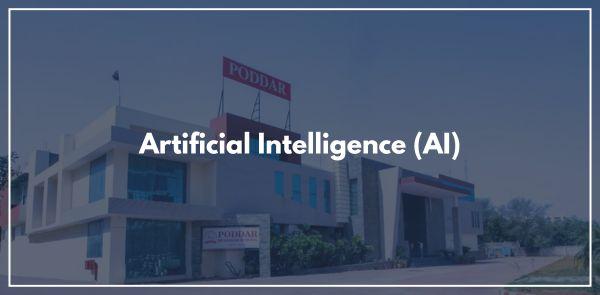
Generative Artificial Intelligence (AI) is revolutionizing business operations by enabling the creation of new content, optimizing processes, and enhancing customer experiences. By leveraging advanced technologies such as large language models (LLMs), natural language processing (NLP), and deep learning, companies can drive innovation and maintain a competitive edge. This article explores the multifaceted applications of generative AI in business transformation, including customer engagement, marketing optimization, operational efficiency, financial services innovation, and consulting. It also addresses the challenges and ethical considerations associated with integrating generative AI into business practices.
At Poddar Business School, one of the best management institutions in Jaipur, AI-driven innovation is focused, equipping students with the skills to leverage data, automation, and smart solutions for business success in the digital era.
Leveraging Generative AI for Business Transformation
Generative Artificial Intelligence (AI) is revolutionizing business operations by enabling the creation of new content, optimizing processes, and enhancing customer experiences. By leveraging advanced technologies such as large language models (LLMs), natural language processing (NLP), and deep learning, companies can drive innovation and maintain a competitive edge.
Enhancing Customer Experiences
Businesses are utilizing generative AI to personalize customer interactions and streamline services. AI-driven chatbots and virtual assistants, powered by NLP and conversational AI, provide tailored recommendations and support, leading to improved customer satisfaction and engagement.
Optimizing Marketing Strategies
In marketing, generative AI assists companies in optimizing advertising efforts and connecting with target audiences more effectively. By analyzing vast amounts of data, AI can generate insights that inform content creation, keyword research, and campaign strategies, leading to more effective and targeted marketing efforts. For instance, companies like Delta Air Lines and Mars have leveraged AI to optimize ad performance and connect advertising with sales data, resulting in significant revenue attribution.
Streamlining Operations
Operational efficiency is another area where generative AI proves invaluable. AI-powered systems can automate routine tasks, analyze data for decision-making, and enhance supply chain management, leading to reduced costs and improved productivity. For example, AI-driven business process automation can streamline workflows and reduce manual errors.
Financial Services Innovation
The financial sector is experiencing transformation through generative AI. Banks and financial institutions are leveraging AI to enhance digital assistants, improve customer support systems, and combat financial fraud, marking significant advancements in the industry. AI-powered data analytics enables more accurate risk assessment and personalized financial advice.
Consulting and Professional Services
Consulting firms are adapting to AI advancements by adopting an "engineering first mindset." Investing in AI tools and platforms enables professionals to automate routine tasks, enhance data analysis, and provide more strategic insights to clients. Agentic AI platforms, capable of autonomous decision-making, are being introduced to transform business operations and service delivery.
Challenges and Considerations
Despite its benefits, integrating generative AI into business operations presents challenges, including data privacy concerns, ethical considerations, and the need for substantial investment in technology and training. Companies must navigate these issues carefully to fully realize the potential of AI-driven transformation. Ensuring transparency and accountability in AI applications is crucial to maintain trust and compliance with regulations.
Conclusion
Generative AI stands at the forefront of business innovation, offering tools to enhance customer engagement, streamline operations, and drive growth. As organizations continue to explore and implement these technologies, they must balance innovation with ethical responsibility to achieve sustainable success in the evolving digital landscape.
